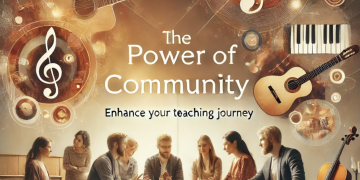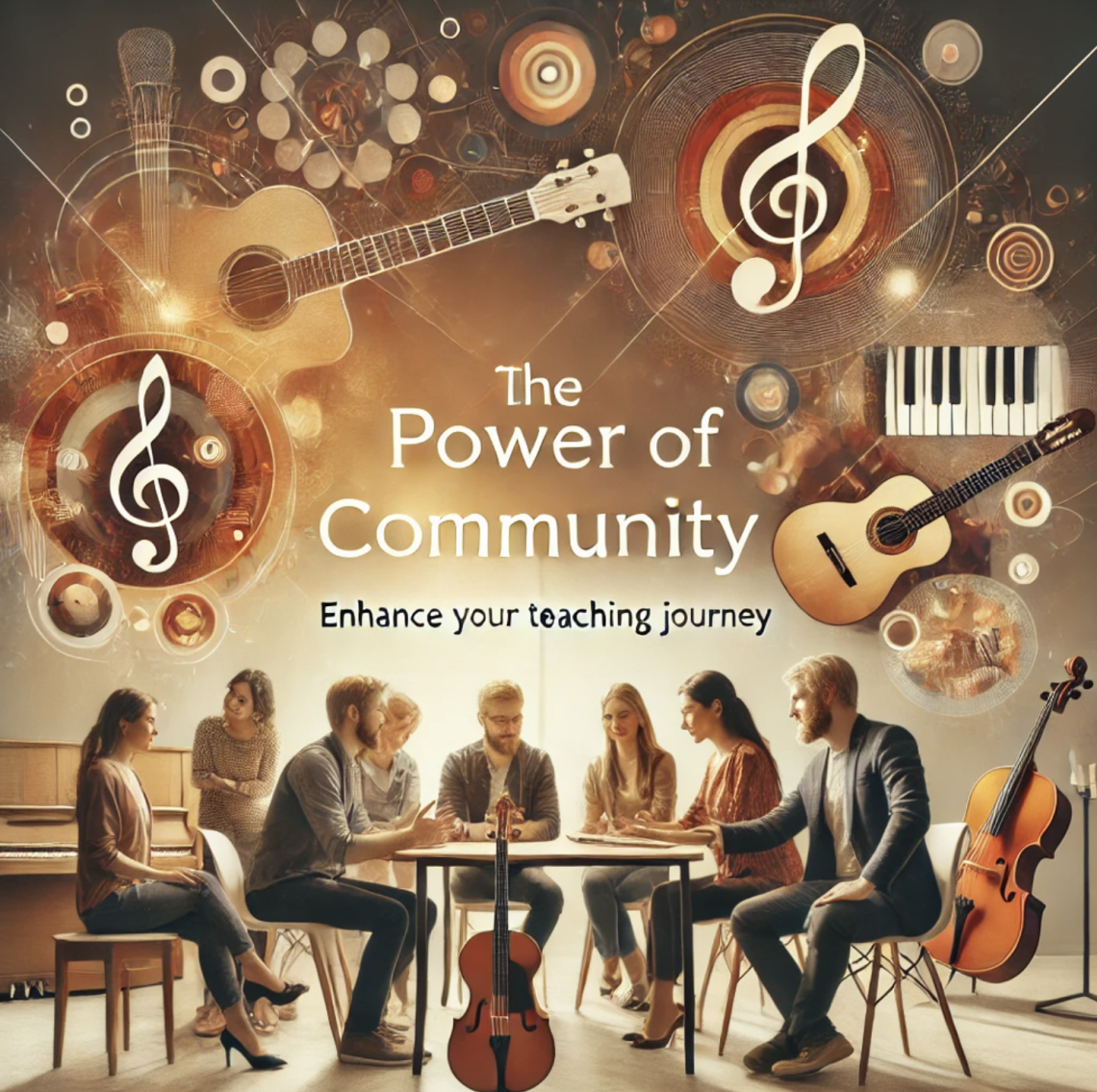The bell rang as Mrs. Sanders closed the piano lid, feeling more exhausted than ever. The energy in her music room had been waning for weeks, and her once-enthusiastic students now seemed distracted, even disengaged. No matter how hard she tried to reignite their excitement, each rehearsal felt like a battle to keep their attention.
As the final student slung their backpack over their shoulder and headed for the door, Mrs. Sanders wondered what she was doing wrong. She’d been teaching for years—shouldn’t she have figured this out by now? But lately, between prepping for competitions, handling classroom behavior, and managing her own stress, she felt like she was barely keeping her head above water.
That evening, after another late night of lesson planning, Mrs. Sanders came across an email from a former colleague who had just finished a mentorship program. They spoke about how reaching out for help had revitalized their teaching methods and reduced their burnout. Could asking for help be the answer?
It’s easy to feel like you should have all the answers as a music teacher. After all, you’re the one standing in front of the classroom, guiding your students toward musical growth. But knowing when to reach out for help—whether from a mentor, a supportive community, or even a digital assistant—can make a world of difference in your teaching practice. Here are five signs that it might be time to ask for help, and how doing so can make you a better music teacher.
Your Students Seem Disengaged
Music is supposed to energize, inspire, and connect students. But when your classroom feels lifeless, and your students seem more interested in their phones than their instruments, it’s a clear sign something is off. Maybe your tried-and-true methods aren’t working anymore, or maybe the group dynamic has shifted, leaving you unsure of how to reignite their passion for learning.
Why It’s a Sign: Student engagement is a key indicator of your classroom’s health. When students are checked out, it’s frustrating for you and means they aren’t absorbing the material.
How Asking for Help Can Solve It: Reaching out to a peer or mentor can offer fresh strategies for sparking student interest. Whether using new rehearsal techniques, integrating technology into lessons, or adjusting classroom activities to better suit your students, a fresh perspective can make all the difference.
What You Can Do: The Music Teacher Guild (MTG) mentorship program is a great place to connect with experienced music educators who can help diagnose classroom issues and suggest strategies to re-engage students. Sometimes, it takes an outside eye to see what adjustments can bring the energy back to your music room.
You’re Feeling Overwhelmed or Burnt Out
Music teaching can be a high-pressure job—juggling lesson planning, rehearsals, concerts, grading, and, often, personal performance obligations. Over time, these demands can take a toll, leading to stress, exhaustion, and even burnout. If you’re constantly drained, lacking motivation, or dreading another day of teaching, it’s time to ask for help.
Why It’s a Sign: Burnout not only affects your well-being but can also trickle down into your teaching, making it harder to show up for your students with the enthusiasm they need.
How Asking for Help Can Solve It: Mentors and peers who have experienced burnout themselves can offer invaluable advice on managing stress, setting boundaries, and maintaining a work-life balance. Even simple changes, like learning how to prioritize tasks or sharing responsibilities with colleagues, can alleviate some of the pressure.
What You Can Do: The MTG mentors specialize in helping teachers navigate burnout and stress. They can offer personal insights into how to manage the unique challenges of music education. And for those who prefer a non-human touch, the Music Ed Mentor GPT can provide stress-reduction strategies and time management tips—available 24/7 when you need them most.
You’re Stuck in a Teaching Rut
Even the best teachers hit a point where they feel like they’re recycling the same old lessons or rehearsal techniques year after year. If you’re feeling uninspired, it’s likely your students are too. Teaching ruts are a normal part of the job, but staying in one for too long can stifle both your creativity and your students’ progress.
Why It’s a Sign: Stagnation in teaching affects not only your personal satisfaction but also the development of your students. If you’re not evolving as a teacher, your students aren’t growing as musicians.
How Asking for Help Can Solve It: Reaching out to peers, mentors, or even online communities can provide fresh ideas and inspiration to re-energize your lessons. Sometimes a simple conversation with someone outside your usual circle can spark creativity and bring new life to your curriculum.
What You Can Do: MTG offers access to mentors who can share innovative ideas, suggest new methods, and help you shake things up in your classroom. And if you’re averse to reaching out to people, the Music Lesson Planner AI can quickly generate lesson ideas, rehearsal techniques, or new approaches to teaching.
You’re Struggling with Classroom or Rehearsal Management
Managing a room full of young musicians, all with varying skill levels, can be overwhelming. Whether it’s keeping students on task during rehearsal or maintaining discipline in the classroom, it’s not uncommon to struggle with finding the right balance of structure and creativity.
Why It’s a Sign: If your rehearsals feel chaotic and unproductive, or you’re frequently dealing with behavioral issues, it’s time to ask for guidance. Struggling in these areas not only impacts student progress but can also lead to your own frustration and fatigue.
How Asking for Help Can Solve It: A mentor or coach can provide you with proven strategies for managing classroom dynamics and running efficient, focused rehearsals. By learning how to adapt your leadership style and classroom structure, you can regain control and create an environment that fosters student success.
What You Can Do: MTG’s mentors have years of experience in classroom and rehearsal management, and they’re ready to share practical tips. Alternatively, the Music Ed Mentor GPT can offer real-time rehearsal strategies and classroom management techniques tailored to your specific needs.
You Want to Grow, but Don’t Know Where to Start
Professional growth is essential for any teacher, but it’s not always clear how to move forward. Maybe you want to pursue additional certifications, expand your skill set, or find new ways to challenge yourself, but you’re unsure of the next steps.
Why It’s a Sign: Stagnation in your own professional development can lead to dissatisfaction and missed opportunities. If you’re feeling stuck in your career, it’s time to seek out guidance on how to level up.
How Asking for Help Can Solve It: A mentor can help you map out a professional growth plan, providing guidance on certifications, networking, career paths, and even new teaching methodologies. With the right advice, you can set goals and take actionable steps toward personal and professional fulfillment.
What You Can Do: MTG connects you with mentors who’ve been through similar career transitions and can guide you toward the growth opportunities you’re looking for. If you’re more comfortable exploring options independently, Music Ed Mentor GPT can provide career advice and suggestions to get you moving forward.
Conclusion: Reaching Out Is a Sign of Strength
Recognizing these signs is the first step toward becoming a more effective, less stressed, and more engaged music teacher. Whether you choose to seek help from a supportive community, book a call with a mentor, or engage with a tool like Music Ed Mentor GPT, asking for guidance can only strengthen your teaching practice and improve your students’ experience.
Don’t hesitate to reach out. Explore the MTG mentorship program or start with a conversation with Music Ed Mentor GPT today to get the personalized support you need.
Elisa Janson Jones is a dynamic leader with expertise in music education, digital product development, and nonprofit management. Founder and CEO of both the Music Teacher Guild and Sovereign+, she excels in strategic growth, cross-functional collaboration, and creating impactful learning solutions.




















